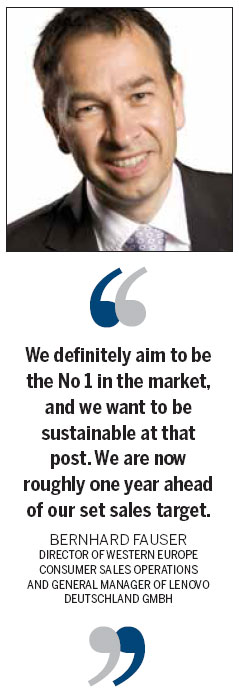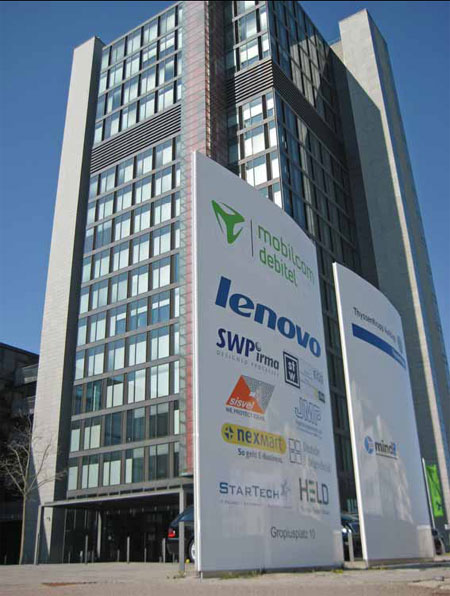Lenovo sees balance as key to growth in Germany
Updated: 2012-09-21 13:31
By Hu Yuanyuan (China Daily)
|
|||||||||||
|
Lenovo's acquisition of Medion AG is expected to boost its position in the consumer electronics market in Germany. Provided to China Daily |

Chinese electronics group reviewing its strategy after major acquisitions
The Chinese computer maker Lenovo Group plans to strengthen its brand in the consumer products market in Germany, seeking growth more closely aligned with that of the business sector, the company says.
In Germany, 55 percent of Lenovo's sales now go to private consumers and the rest to business.
"We will further explore the consumer market by diversifying our new product portfolio and adding new partners," says Bernhard Fauser, director of Western Europe consumer sales operation and general manager of Lenovo Deutschland GmbH .
Growing the company's business and consumer sides will help it become No 1 in the PC market, he says.
Lenovo's acquisition of Medion AG, a German multimedia and consumer electronics manufacturer, is likely to boost the company's market share in the consumer sector.
"Now we would like to achieve a better synergy between these two brands," Fauser says. Medion's products offer good value for money and are sold mainly through supermarkets, he says. "Now we want to add Lenovo's brand through our classic retailers.
"We would like to launch a product campaign in the private consumer sector when the market is ready and people's awareness of the brand is ready."
Lenovo Group Ltd became the world's No 2 PC vendor in the third quarter of last year, and is now on track to overtake Hewlett-Packard Co as the world's biggest PC maker by shipments. The research firm IDC says Lenovo had global market share of 14.9 percent in the second quarter of this year, compared with HP's 15.5 percent. The industry tracker Gartner reckons the gap is even smaller, a fifth of a percentage point.
The company became the second-largest PC vendor in Germany last quarter.
"We definitely aim to be the No 1 in the market, and we want to be sustainable at that post," Fauser says. "We are now roughly one year ahead of our set sales target."
The company's target, Fauser says, is to grow at a rate above the market average. "Right now, we've beaten the IDC's benchmark growth rate ... nine quarters in a row."
Frederick Wong, executive director of Avant Capital Management (Hong Kong) Ltd, which has shares in Lenovo, says it is only a matter of time before Lenovo becomes No 1, which will make it the first Chinese company to become world No 1 in a technology sector.
"It won't be surprising at all if it happens later this year," Wong says.
Lenovo's rise has been helped by its buying of Medion and forming a joint venture with NEC Corp of Japan last year, as well as its purchase of IBM Corp's PC business in 2005.
With those deals sealed, Lenovo's sales in developed economies rose to $3.4 billion (2.6 billion euros), an increase of 85 percent, from January to March, year-on-year. In the year ended March, turnover was $29.6 billion.
Fauser says Lenovo has been strong in the commercial business, and that the Medion acquisition has given it a boost on the consumer side.
"Given Medion's influence in Germany's consumer products market, we are more balanced in developing these two lines of business. But we would like to further strengthen Lenovo's Idea brand in the consumer products market."
The acquisition of Medion is also a demonstration of Lenovo's "protect and attack" strategy - protecting its enterprise business and strong base in China, and attacking growing segments such as smartphones and tablets.
"We have a focus on a clear and consistent strategy, and that also helps us to win customer loyalty," Fauser says.
About 90 percent of Lenovo products are sold indirectly, he says, so establishing a sound relationship with its partners is critical.
Oliver Rootsey, an account manager with Lenovo in Germany, has been with the company for seven years and now works in the company's commercial business sector.
After Lenovo bought the IBM PC business, some IBM clients wondered whether Lenovo could deliver high-quality products, he says.
"We lost some of our clients at the very beginning, but most of them came back later when they recognized that it is a soft merger and we lived up to their expectation for high-quality products. There is a gradual shift in the perception among people in the EU: China is (moving from) imitation to innovation."
The biggest challenge, Fauser says, is that in Germany Lenovo is in a very mature market and the global economy, including that of the EU, is slowing.
IDC forecast computer shipments worldwide would rise 5 percent in 2012, which it called a challenging year because of the European debt crisis. The growth in shipments worldwide was largely flat in the second quarter, the seventh straight quarter of growth of and below 5 percent in the industry.
The investment bank Piper Jaffray & Co said in a report: "We remain positive on Lenovo's market share expansion, but the absolute growth is nevertheless being negatively impacted by a slower market."
Overall PC demand could pick up this year with the launch of Microsoft's Windows 8. However, that prospect is not necessarily as good for Lenovo as it may first appear, because the new operating system is designed to run on laptops and tablets, and tablet PCs are not Lenovo's strongest area.
Such a difficult time, Fauser says, also provides opportunities for large market players.
"Some of the smaller companies will disappear or go to the niche market, thus giving you the room to grow further. It will be the survival of those biggest at the end of the day."
huyuanyuan@chinadaily.com.cn
(China Daily 09/20/2012 page21)
Today's Top News
Rescuers race against time for quake victims
Telecom workers restore links
Coal mine blast kills 18 in Jilin
Intl scholarship puts China on the map
More bird flu patients discharged
Gold loses sheen, but still a safe bet
US 'turns blind eye to human rights'
Telecom workers restore links
Hot Topics
Lunar probe , China growth forecasts, Emission rules get tougher, China seen through 'colored lens', International board,
Editor's Picks

|

|

|

|

|

|






